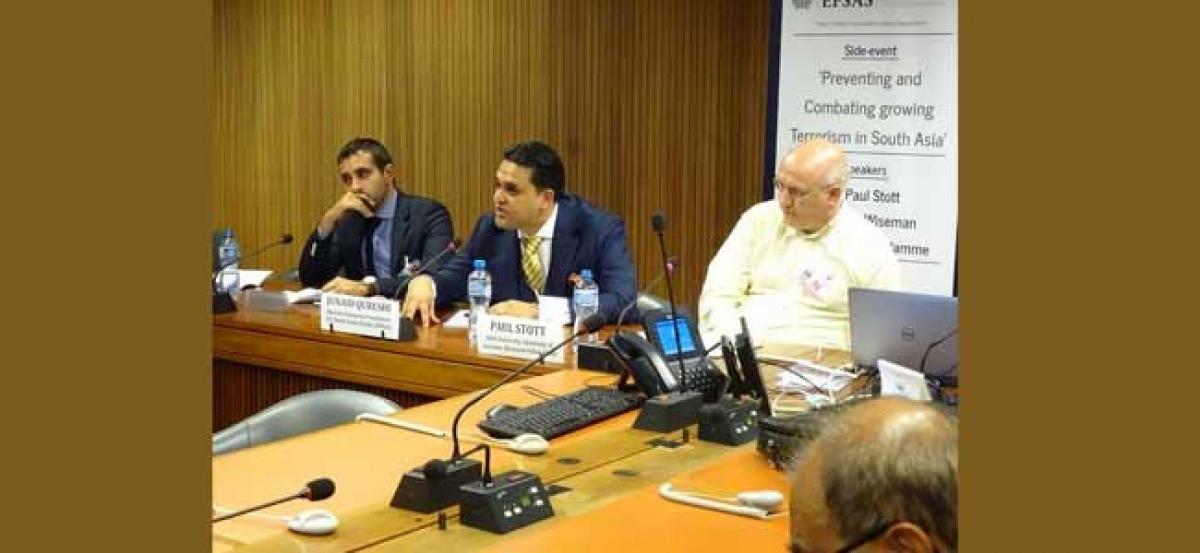European experts corner Pakistan for sponsoring terror

European academics and experts on Wednesday targeted Pakistan for sponsoring terrorism while highlighting the factual and analytical errors in the report on Jammu and Kashmir by the United Nations UN Office of the High Commissioner of Human Rights OHCHR in Geneva
Geneva [Switzerland]: European academics and experts on Wednesday targeted Pakistan for sponsoring terrorism while highlighting the factual and analytical errors in the report on Jammu and Kashmir by the United Nations' (UN) Office of the High Commissioner of Human Rights (OHCHR) in Geneva.
Speaking at an event titled 'Preventing and Combating Growing Terrorism in South Asia', during the 39thSession of the United Nations Human Rights Council (UNHRC) here, Paul Stott, a Research Fellow at the European Foundation for South Asian Studies (EFSAS), discussed a range of issues, primarily focusing on Pakistan's strategic interest and the flaws in the recent report on Jammu and Kashmir by the OHCHR.
He discussed many of the analytical and methodological flaws found in the recently published report, the implications that had not been expressed, as well as the fact that the report only covers the situation in Jammu and Kashmir during the period between June 2016 and April 2018.
Speaking to ANI, Scott said, "There are lots of errors in the report historically, particularly as it really didn't grasp many of the terrorist organizations operating in Indian Kashmir, all proxies for the Pakistani state.
Terrorist groups in the very long term tend to prosper and have safe havens or some degree of support from Pakistan and that has long been the case in Kashmir and I think under the new administration of Imran Khan there is little chance of that."
Another key issue raised was the lack of appropriate terminology used for Terrorist organizations in the report. According to Scott, the issue is prominent in the OHCHR report on Kashmir where terrorist groups have been referred to as 'armed' groups.
He highlighted this reference as an immense understatement for the differing groups' actions in the region, stressing that the report ironically referred to groups such as Hizbul Mujahideen, Lashkar-e-Taibah and Jasih-e-Muhammed as 'armed' groups, which are designated as terrorist organizations by the UN.
Stott stressed that the conflict in Kashmir was Pakistan's proxy war and this should have been identified as such, whereas the OHCHR recommendations avoid this subject.
Meanwhile, Dorothee Vandamme, a Research Fellow at the Genesys Network, discussed thoroughly the influence of the Pakistani Army in politics and the mainstreaming of terrorist organizations in the electoral framework.
According to Vandamme, the military power was engrained since the formation of the country in the 1940s, thus ratifying the establishment as the only institution which supposedly could hold the country together, resulting in the military remaining the strongest entity within the state.
She further argued that in order to grasp more power, the military has felt it necessary to enter mainstream politics by mainstreaming terrorists, resulting in a 'softer' approach to power, rather than violence and enforced control.
Jason Wiseman, Special Advisor to the Committee on Terrorism in the EU Parliament, and a Research Analyst at the NATO Association of Canada and Former General Secretary of the Atlantic Treaty Association, described in-depth the counter-terrorism strategies that the EU member States need to deploy in order to combat the spread of violent extremism.
He highlighted three main topics throughout his speech: the approach that member States adopt against terrorism, the current threat environment in Europe, and the actions the EU and NATO undertake in order to address this threat.










